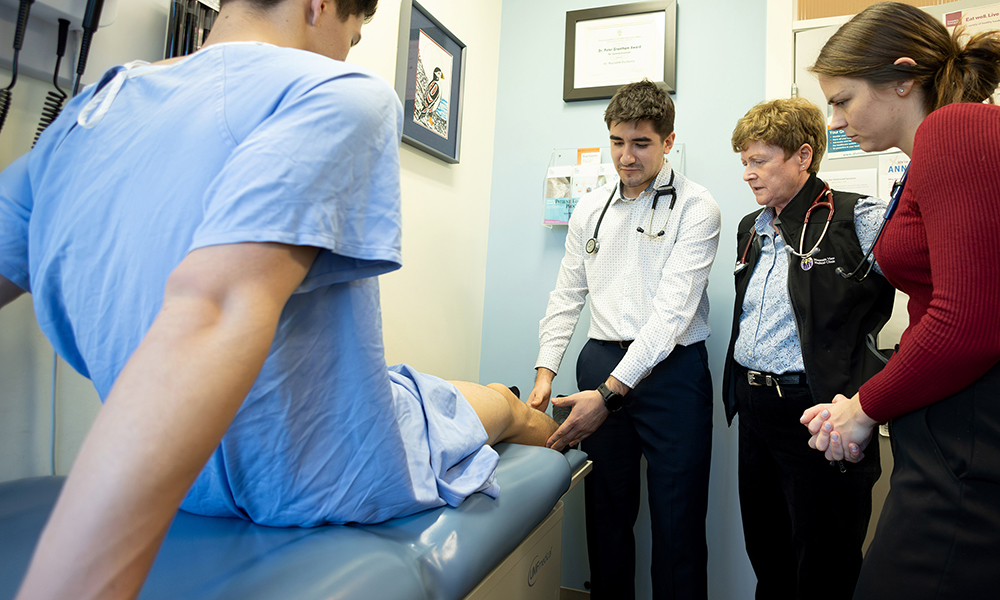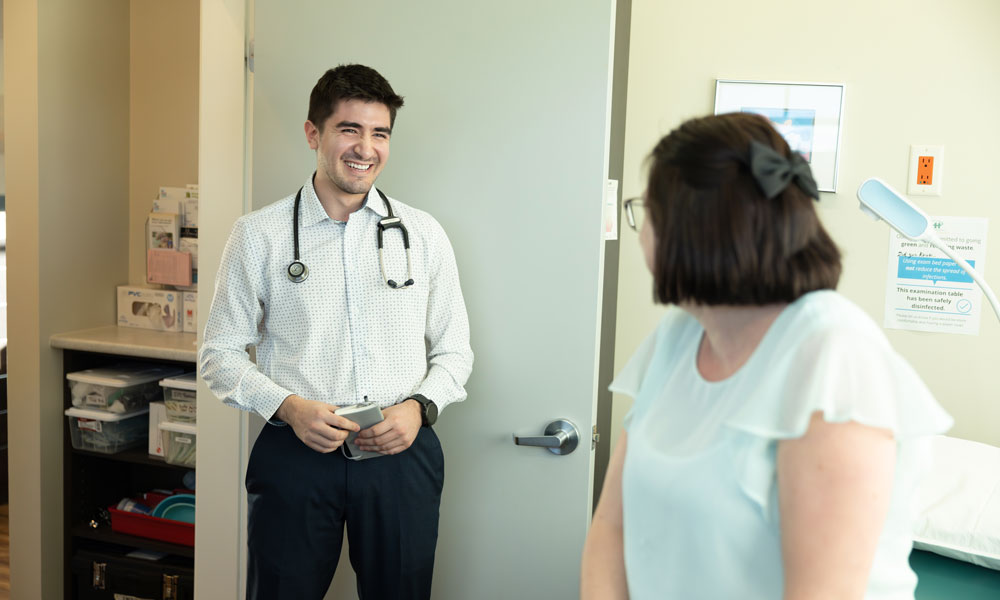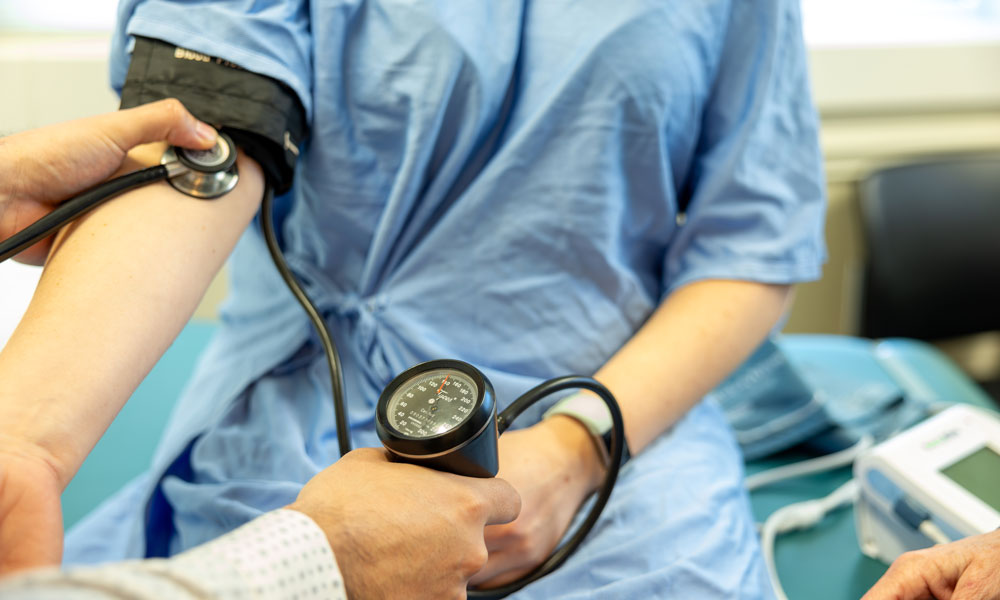
Kara Ruff, a Southern Medical Program (SMP) student at UBC Okanagan, examines a volunteer patient.
KARA RUFF DIDN’T HAVE TO WAIT LONG FOR AN INTRODUCTION to hands-on patient care as a first-year Southern Medical Program (SMP) student at UBC Okanagan.
Before heading into a family doctor’s office in her first week of medical school, her preceptor asked Ruff to research a patient’s disability to be prepared to conduct a physical exam. Ruff said she went into the assignment feeling anxious but emerged feeling empowered.
“I did my research as best as possible,” she says. “It was definitely nerve-wracking. Facing the challenge head-on, I learned early that the best education often comes from stepping out of your comfort zone. That first day, daunting as it was, set the stage for a journey where every patient interaction became a profound learning experience.”
Ruff’s experience embodies the UBC Faculty of Medicine’s philosophy of early patient contact and learning alongside family physicians. By thrusting students into real-world scenarios from the start, the program instills a patient-centred approach to health care, says Dr. Marjorie Docherty, the Family Practice Lead for SMP.
This collaborative effort involves local family physicians who open their doors to mentor the doctors of tomorrow. This gesture speaks volumes about the community’s commitment to nurturing future medical professionals.

SMP student Dylan Nemes examines a volunteer patient alongside Dr. Marjorie Docherty, Family Practice Lead for SMP, and SMP classmate Kara Ruff.
Across the Interior Health region, over 1,600 family physicians and specialists help train medical students in hospitals, community health centres and family practice clinics as part of UBC’s four-year medical undergraduate degree program.
Further, Dr. Docherty’s role extends beyond the urban setting of Kelowna into the rural landscapes of British Columbia. Her efforts in placing third-year students in rural family practice rotations help support the unique health-care challenges of these areas.
“Our rural family physicians are amazing in terms of responding to the requests to support our training needs,” she says. “Preceptors are really overwhelmed, and they teach our students because they care.”
Dr. Docherty says the rural family practice training provides a diverse and rich learning environment for the students. SMP is training skilled physicians and instilling in them a sense of community service and adaptability, qualities essential for the ever-evolving landscape of health care.
“By mentoring these bright medical students, we’re not just shaping the future of health care; we’re strengthening our communities’ present and future wellbeing,” Dr. Docherty says. “Every doctor who opens their practice to a student contributes to a legacy of compassionate, skilled care that benefits us all.”

SMP student Dylan Nemes.
SMP student Dylan Nemes says what he appreciates most about the program’s approach is how much he was drawn to continuity in health care. He watched how a family doctor becomes a trusted resource throughout their patients’ lives.
“I saw a patient early on and then again two months later,” Nemes says. “This patient had a complicated medical history and felt overwhelmed. As a first-year student, I listened to the patient and the doctor’s assessment.
“On the return visit, the difference was profound. The patient, whom I had initially spent about 15 to 20 minutes with, remembered our conversation and was incredibly grateful. Seeing how a brief interaction could significantly impact her life was surprising and deeply gratifying.”
Those interactions can’t be simulated in a classroom, says Nemes. “It’s completely different. You remember everything so much better because you have this face, this person, this experience,” he says.
Having students in the office also benefits working doctors and the entire practice, from front-line administration staff to patients, says Kelowna family physician Dr. Leanne Armstrong. Over the years, she has opened her Kelowna clinic’s doors to many SMP students and says they energize everyone.

SMP student Dylan Nemes takes a blood-pressure reading from a volunteer patient. Patient interactions are part of first- and second-year studies at SMP.
“Having students in the clinic is a breath of fresh air,” she says. “Their enthusiasm and perspective enhance our practice and invigorate the entire team. It’s a reminder of the vibrant energy and passion that drives health care.”
That welcoming attitude goes far in helping students settle into their roles, Nemes says, knowing how challenging it can be for a doctor to run their own office or clinic while mentoring students.
“I’m deeply grateful to the doctors who dedicate their time to teach us, even though it demands more from them. The impact on my education is profound. Each doctor brings a lifetime of experience, imparting knowledge and skills that shape my understanding and approach to medicine.”
Ruff says each of her experiences with a family doctor fostered resiliency, confidence and compassion. The approach honed her practical skills and nurtured a deep sense of adaptability—important traits for aspiring physicians. She says the hands-on training was vital for her; she identifies as Metis and wants to work in under-served areas she knows to offer unique challenges in accessing services and life-giving medicines and supplies.
“I wanted a career where I saw the impact that I was having on people every day,” she explains. “I’m from a small town—Campbell River—on Vancouver Island. I applied through the rural pathway, and I’m also Indigenous—I’m Métis. As an Indigenous female physician, I want to help as many people and have as great an impact as possible. That’s why I went into medical school.”